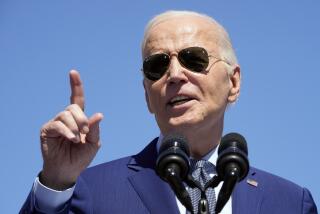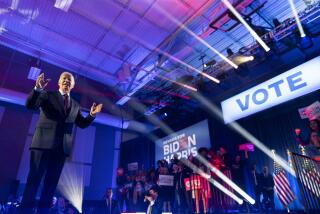Campaign Focus Shifts to How Clinton Is Doing
- Share via
For the last seven weeks the Republican primary campaign has been largely a referendum on the front-runner, Sen. Bob Dole. Now, with the nomination in hand, Dole moves into a contest that will be principally a referendum on his opponent, President Clinton.
For months, Dole has worked to sell himself--an uncompleted task that remains central to his success. But over the next eight months, Dole’s most critical task will be to convert voters who now seem inclined to give Clinton a second term.
Traditionally, presidential elections have turned more on assessments of the incumbent than on the challenger. And over the past year, the assessment of Clinton has grown increasingly positive.
In fact, since November, Clinton has, for the first time in his presidency, consistently pushed his approval rating above 50%. In the past, something has always seemed to cause Clinton to sink just when he appeared to be strong. But if Clinton this time can sustain his level of support through the summer, the history of presidential elections over the past half century suggests he’s a strong favorite for reelection, no matter what voters come to think of Dole.
“We treat this like it is a race between two men, but that comes very secondarily,” says Guy Molyneux, a Democratic pollster. “The first question voters ask is: Do we want the guy we have to get the job again?”
For all the complex analysis that attaches to them, presidential campaigns that involve an incumbent almost always pivot on the public’s verdict about his performance, experts say. The calculus confronting Dole and Clinton (and perhaps Ross Perot as well) is in many respects no more complicated than this: Voters who think the president is doing a good job tend to vote for his reelection. Those who don’t, tend to vote against him.
Polls and interviews suggest that relatively few voters who believe Clinton is doing a good job are likely to vote for Dole on the theory that he would be even better. If anything, the pervasive skepticism about politicians may make many Americans even more reluctant to trade a “devil they know” for one they don’t--unless they consider the incumbent “devil” unacceptable.
“They never follow through with what they say they are going to do,” Steve Goodman, a lumberyard foreman from Pomona said recently to explain why he would vote for Clinton again despite disappointment in his performance. “But Clinton’s been there. So I don’t think I want to take a chance anymore.”
The most recent Times Poll in California found that voters who had a positive view of Clinton’s job performance preferred him over Dole by 89% to 7%. Those who gave Clinton negative marks preferred Dole by 82% to 12%. The most recent NBC/Wall Street Journal national survey found a similar division.
Richard A. Brody, a Stanford University political scientist who specializes in public opinion, says that polling over the past 50 years shows that presidents with a job approval rating of 48% or above by early summer of the election year--traditionally the point between the end of the primaries and the beginning of the convention--are strong favorites to win the November election.
“If Clinton is still above 50% [by then] . . . the most probable outcome is that he will get a majority of the popular vote,” Brody says, in a view echoed by officials at the Gallup Organization, a leading polling firm.
In the effort to tug Clinton back below 50%, Dole faces one formidable hurdle and one difficult choice. The hurdle is his inability to spend much money on television or anything else until the Republican National Convention in August. Because the GOP primary calendar was so condensed, Dole has already neared the legal limit on pre-convention spending.
To help fill the gap, the Dole campaign is exploring how to mobilize Republican elected officials (particularly the 31 GOP governors) into a unified campaign that would attempt to enlarge the 1996 election from a personal choice between Clinton and Dole into a referendum on two distinct views about the role and size of government.
In an interview, Republican National Committee Chairman Haley Barbour said the party would soon broadcast ads that will attempt to draw “two big comparisons”: one between Republican and Democratic visions of government’s role in the society, the other between Clinton’s record and his promises in 1992.
As they have been for weeks, those will continue to be central themes for Dole in his appearances as well. “People are going to be reminded of a lot of the promises he made in 1992,” said one Dole advisor. “People are also going to be reminded of all the things they want from government--a balanced budget, welfare reform, tax cuts--that they are not getting because Bill Clinton is in the White House.”
These arguments are not without risk for Dole. Since 1995, support for the GOP congressional agenda has substantially eroded in public opinion polls, and Democrats almost uniformly say they would welcome an effort to convert the 1996 election into a referendum on the GOP “contract with America.”
“It’s a huge mistake to attach themselves to that,” says one White House official.
The continued public dissatisfaction with Congress looms over the key tactical decision Dole faces for the next several months: choosing where to spend his time and deliver his message. Those around him say Dole is clearly drawn to running his campaign from the floor of the Senate, where he hopes to pass legislation that both demonstrates he can get things done and sharpens contrasts with Clinton.
Yet many conservative analysts, including some in Dole’s camp, see peril in that approach. For one thing, spending the next several months primarily in Congress would reinforce Dole’s association with an institution “that is just not popular,” notes Karlyn Keene Bowman, an opinion analyst at the American Enterprise Institute.
Some Republicans say recent events have starkly demonstrated how difficult it will be for Dole to control the policy debate with Clinton from the floor of the Senate. In just the past week, House Republicans presented Dole with one issue he didn’t want to discuss by voting to repeal the assault weapons ban--and then Senate Democrats placed him in an awkward position by forcing him to kill an effort to vote on increasing the minimum wage.
For these and other reasons, some Republicans hope Dole decides to spend less time in Washington and more time traveling the country, defining in clearer terms than he has so far the priorities and agenda he would bring to the White House.
“We all need to understand,” says one GOP operative close to the campaign, “being the Republican nominee is a bigger job than being the Senate majority leader.”
The task facing Dole is underscored by the history of 1992. By this time four years ago, George Bush’s approval rating had dropped from its stratospheric heights during the Persian Gulf War to just above 40%--a weak showing that foreshadowed his repudiation that November. By contrast, Clinton’s approval rating has been rising over the past six months.
For most of his presidency, Clinton was unable to generate approval from a majority of the public. But polls showed that most Americans sided with him during the standoff with congressional Republicans over the budget last fall, and the confrontation has provided Clinton with a lasting boost in his approval rating. The last eight national polls measuring public sentiment toward Clinton--all taken since late January--show him with approval ratings of 51% to 55%.
Those are stronger numbers than Clinton received earlier in his presidency, but they are hardly Olympian. Many political operatives in both parties agree with Bowman, who says that Clinton lacks the strong support that undergirded Reagan.
“To the extent Clinton is gaining,” she says, “he is gaining in the middle column, and that could swing either way.”
More to Read
Get the L.A. Times Politics newsletter
Deeply reported insights into legislation, politics and policy from Sacramento, Washington and beyond. In your inbox twice per week.
You may occasionally receive promotional content from the Los Angeles Times.










